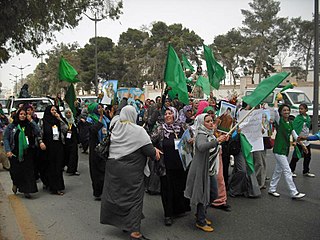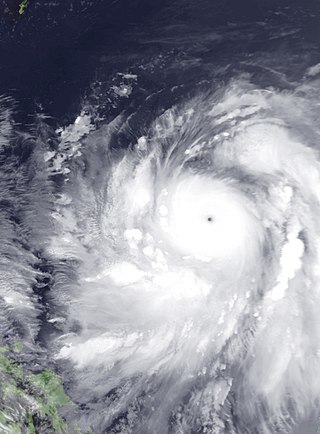Related Research Articles

Libya, officially the State of Libya, is a country in the Maghreb region in North Africa. It is bordered by the Mediterranean Sea to the north, Egypt to the east, Sudan to the southeast, Chad to the south, Niger to the southwest, Algeria to the west, and Tunisia to the northwest. Libya is made of three historical regions: Tripolitania, Fezzan, and Cyrenaica. With an area of almost 1.8 million km2 (700,000 sq mi), it is the fourth-largest country in Africa and the Arab world, and the 16th-largest in the world. Libya has the 10th-largest proven oil reserves in the world. The largest city and capital, Tripoli, is located in western Libya and contains over a million of Libya's seven million people.

Sabha, or Sebha, is an oasis city in southwestern Libya, approximately 640 kilometres (400 mi) south of Tripoli. It was historically the capital of the Fezzan region and the Fezzan-Ghadames Military Territory and is now capital of the Sabha District. Sabha Air Base, south of the city, is a Libyan Air Force installation that is home to multiple MiG-25 aircraft.
This timeline of United States government military operations, based in part on reports by the Congressional Research Service, shows the years and places in which U.S. military units participated in armed conflicts or occupation of foreign territories. Items in bold are wars most often considered to be major conflicts by historians and the general public.
A temporary capital or a provisional capital is a city or town chosen by a government as an interim base of operations due to some difficulty in retaining or establishing control of a different metropolitan area. The most common circumstances leading to this are either a civil war, where control of the capital is contested, or during an invasion, where the designated capital is taken or threatened.

An airlift is the organized delivery of supplies or personnel primarily via military transport aircraft.

Sirte, also spelled Sirt, Surt, Sert or Syrte, is a city in Libya. It is located south of the Gulf of Sirte, between Tripoli and Benghazi. It is famously known for its battles, ethnic groups, and loyalty to Muammar Gaddafi. Also due to developments in the First Libyan Civil War, it was briefly the capital of Libya as Tripoli's successor after the Fall of Tripoli from 1 September to 20 October 2011. The settlement was established in the early 20th century by the Italians, at the site of a 19th-century fortress built by the Ottomans. It grew into a city after World War II.

Abdessalam Jalloud is the former Prime Minister of Libya. His tenure lasted from 16 July 1972 to 2 March 1977, during the government of Muammar Gaddafi. He was also Minister of Treasury from 1970 until 1972.

Libya pursued programs to develop or acquire weapons of mass destruction from when Muammar Gaddafi seized control of Libya in 1969 until he announced on 19 December 2003 that Libya would voluntarily eliminate all materials, equipment and programs that could lead to internationally proscribed weapons. This included weapons of mass destruction and long-range ballistic missiles.
There have been no operational railways in Libya since 1965, but various lines existed in the past. Since 1998, plans for an extensive system have been developed, but work has largely halted since the outbreak of the First Libyan Civil War in 2011.

Libya–United States relations are the bilateral relations between the State of Libya and the United States of America. Relations are today cordial and cooperative, with particularly strong security cooperation only after the 2012 attack on the US liaison office or mission in Benghazi. Furthermore, a Gallup poll conducted in March and April 2012 found that Libyans had "among the highest approval" of US leadership in the entire Middle East and North Africa region.

Libya–Russia relations are the bilateral relations between the State of Libya and the Russian Federation. Russia has an embassy in Tripoli, with Libya having an embassy in Moscow. Diplomatic contact between Russia and Libya has generally been close and productive, seeing as both countries have had and continue to see volatile relations with the United States. Former Libyan leader Muammar al-Gaddafi was a close ally of the Soviet Union, despite his country's membership in the Non-Aligned Movement. Russia also regards Libya as one of its strongest allies in the Arab world, and has supported stabilization of the country following the aftermath of the Libyan Civil War. After the outbreak of new conflict, Russia has primarily backed the Tobruk-based House of Representatives over the UN-backed Government of National Accord and various other factions.

The First Libyan Civil War was an armed conflict in 2011 in the North African country of Libya that was fought between forces loyal to Colonel Muammar Gaddafi and rebel groups that were seeking to oust his government. It erupted with the Libyan Revolution, also known as the 17 February Revolution. The war was preceded by protests in Zawiya on 8 August 2009 and finally ignited by protests in Benghazi beginning on Tuesday, 15 February 2011, which led to clashes with security forces who fired on the crowd. The protests escalated into a rebellion that spread across the country, with the forces opposing Gaddafi establishing an interim governing body, the National Transitional Council.
The international reactions to the Libyan Civil War were the responses to the series of protests and military confrontations occurring in Libya against the government of Libya and its de facto head of state Muammar Gaddafi.

The foreign relations of Libya were largely reset at the end of the Libyan Civil War, with the overthrow of Muammar Gaddafi and the Second Libyan Civil War. The current Minister of Foreign Affairs since 15 March 2021 is Najla Mangoush. Although many foreign embassies in Tripoli closed down in 2014 due to the fighting, by the end of 2017 thirty diplomatic missions were reopened in the Libyan capital.

Typhoon Muifa, known in the Philippines as Typhoon Kabayan, was a large, powerful and persistent typhoon which affected a number of countries in the Pacific, killing 22 and causing widespread damage worth US$480 million. It was the ninth named storm, third typhoon and the second super-typhoon of the 2011 Pacific typhoon season.

Typhoon Nanmadol, known in the Philippines as Typhoon Mina, was the strongest tropical cyclone in 2011 to hit the Philippines and also the second most intense tropical cyclone worldwide in 2011, and the first of the year to directly impact Taiwan and the rest of the Republic of China (ROC). Becoming the eleventh named storm, the seventh severe tropical storm and the fourth typhoon of the 2011 Pacific typhoon season, Nanmadol made a total of three landfalls killing 26, and causing widespread damage worth US$26,464,591. The area of low pressure that was about to become Nanmadol formed on August 19. It drifted north and became a tropical depression on August 21, a tropical storm on August 23 and a typhoon on the same night. Nanmadol reached peak strength with winds of 105 knots and 140 knots threatening the Philippines with heavy rain and flash flooding.

The Libyan National Army or the Libyan National Arab Army is a component of Libya's military forces which were nominally a unified national force under the command of Field Marshal Khalifa Haftar when he was nominated to the role on 2 March 2015 by the House of Representatives, consisting at the time of a ground force, an air force and a navy.

The Second Libyan Civil War was a multilateral civil war that lasted from 2014 to 2020 in the North African country of Libya fought between different armed groups, mainly the House of Representatives (HoR) and the Government of National Accord.

The Libyan Crisis refers to the current humanitarian crisis and political-military instability occurring in Libya, beginning with the Arab Spring protests of 2011, which led to a civil war, foreign military intervention, and the ousting and death of Muammar Gaddafi. The civil war's aftermath and proliferation of armed groups led to violence and instability across the country, which erupted into renewed civil war in 2014. The crisis in Libya has resulted in tens of thousands of casualties since the onset of violence in early 2011. During both civil wars, the output of Libya's economically crucial oil industry collapsed to a small fraction of its usual level, with most facilities blockaded or damaged by rival groups, despite having the largest oil reserves of any African country. On October 23, 2020, parties signed a permanent ceasefire.
References
- 1 2 3 4 "508 Chinese evacuated from Libya". Xinhua. August 2, 2014. Archived from the original on August 2, 2014.
- ↑ "35,860 Chinese nationals in Libya evacuated: FM". Xinhua. March 3, 2011.